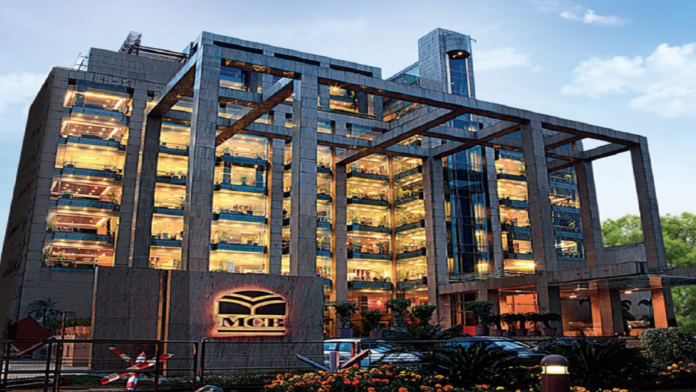The Board of Directors of MCB Bank Limited (MCB) in its meeting under the chairmanship of Mian Mohammad Mansha, on October 27, 2021, reviewed the performance of the bank and approved the condensed interim financial statements for the nine months period ended September 30, 2021.
The Board of Directors has declared 3rd interim cash dividend of Rs4.5 per share i.e. 45% bringing the total cash dividend for the year ending 2021 to 140%, continuing with its highest dividend payout trend.
During the nine months period ended September 30, 2021, MCB Bank Limited reported Profit Before Tax (PBT) of Rs38.27 billion and Profit After Tax (PAT) of Rs22.56 billion. Earnings’ Per Share (EPS) stood at Rs19.03 against an EPS of Rs19.35 reported in the corresponding period last year.
The State Bank of Pakistan continued with its expansionary monetary policy stance during the major part of the period in order to combat the downside risks emanating from COVID-19 outbreak. Average Policy rate registered a decline of 27% (258bps) from an average of 9.59% in corresponding period last year to 7.01% in current period under review. However, on account of historic growth in average current deposits, net interest income of the Bank decreased by 14% only, from Rs55.35 billion to Rs47.74 billion.
Non-markup income registered a growth of 6% and aggregated to Rs14.38 billion against Rs13.56 billion in the corresponding period last year. Improved transactional volumes, surge in business activities, diversification of revenue streams through continuous enrichment of bank’s product suite, investments towards digital transformation and an unrelenting focus on upholding the high service standards supplemented a growth of 14% in fee income whereas dividend and foreign exchange incomes increased by 98% & 21% respectively.
On the operating expenses side, despite sustained inflationary pressures amidst currency devaluation and rising commodity prices, higher compliance related regulatory charges, expansion in branch outreach and regular performance and merit adjustments of the Human Capital, the Bank was able to curtail the total growth to 7%.
On the provision front, disposal of equity scrips resulted in a net reversal of Rs183 million for the nine month period ended September 30, 2021. Proactive monitoring and recovery efforts led to a reversal of Rs. 294 million in specific provision maintained against non-performing loans (NPL’s) while the general loss reserve created amidst the uncertainty surrounding the COVID-19 outbreak was reversed, to the tune of Rs3 billion as the systematic risks surrounding the economic recovery receded and the domestic activity witnessed resurgence.
On the financial position side, the total asset base of the bank, on an unconsolidated basis, was reported at Rs1,931 billion (+10%). An analysis of the asset mix highlights that while the consumer lending book garnered significant interest and grew by Rs6.6 billion (23%) on the back of significant activity in the construction and auto segment, the overall growth in gross advances still remained subdued (+3%) .
Persistent focus on maintaining a robust risk management framework encompassing structured assessment models, effective pre-disbursement evaluation tools and an array of post disbursement monitoring systems has enabled MCB to effectively manage its credit risk. The non-performing loan (NPLs) base of the bank recorded an increase of Rs92 million and was reported at Rs51.28 billion. The captioned increase was primarily attributable to currency devaluation impact of the foreign currency denominated NPLs with no significant accretion in the number of cases.
The bank has not taken FSV benefit in calculation of specific provision and carries an un-encumbered general provision reserve of Rs1.564 billion. The coverage and infection ratios of the bank were reported at 92.2% and 9.7%, respectively.
On the liabilities side, achieving growth in no-cost current account base remained a key strategic objective for the bank. Thereby, non-remunerative deposits grew by 17% to close at Rs570 billion; improving their mix in the total deposits to 39% in absolute terms as at September 30, 2021. CASA mix was reported at 92% whereas the total deposits of the bank grew by 13% as compared to an industry growth of 11% (domestic deposits) to close the period at Rs1,457 billion.
Return on Assets and Return on Equity reported at 1.63% and 18.86% respectively, whereas the book value per share was reported at Rs132.09.
MCB attracted home remittance inflows of USD 2.683 billion, during the period under review, to further consolidate its position as an active participant in SBP’s cause for improving flow of foreign reserves into the country through banking channels. The inflow under the Roshan Digital Account (RDA) initiative has stood over USD 170 million since the inception of the proposition in September 2020.
While complying with the regulatory capital requirements, the bank’s total Capital Adequacy Ratio (CAR) is 19.00% against the requirement of 11.5% (including capital conservation buffer of 1.50% as reduced under the BPRD Circular Letter No. 12 of 2020). Quality of the capital is evident from bank’s Common Equity Tier-1 (CET1) to total risk weighted assets ratio which comes to 16.08% against the requirement of 6%. The bank’s capitalization also resulted in a Leverage Ratio of 6% which is well above the regulatory limit of 3.0%. The Bank reported Liquidity Coverage Ratio (LCR) of 247.94% and Net Stable Funding Ratio (NSFR) of 189.19% against requirement of 100%.
The bank’s exceptional performance has also been recognized by the globally coveted Finance Asia’s Country Awards where it has declared MCB Bank as the “Best Bank in Pakistan” in 2021.
The bank enjoys highest local credit ratings of AAA / A1+ categories for long term and short term respectively, based on PACRA notification dated June 23, 2021.
The bank on consolidated basis is operating the 2nd largest network of more than 1,550 branches in Pakistan. The bank remains one of the prime stocks traded in the Pakistani equity market with 2nd highest market capitalization in the industry.




